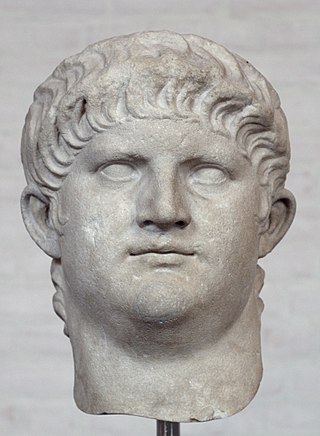Related Research Articles

Tiberius Claudius Caesar Augustus Germanicus was Roman emperor, ruling from AD 41 to 54. A member of the Julio-Claudian dynasty, Claudius was born to Drusus and Antonia Minor at Lugdunum in Roman Gaul, where his father was stationed as a military legate. He was the first Roman emperor to be born outside Italy.

Gaius Caesar Augustus Germanicus, better known by his nickname Caligula, was Roman emperor from AD 37 until his assassination in AD 41. He was the son of the Roman general Germanicus and Agrippina the Elder, Augustus' granddaughter. Caligula was born into the first ruling family of the Roman Empire, conventionally known as the Julio-Claudian dynasty.

Nero Claudius Caesar Augustus Germanicus was Roman emperor and the final emperor of the Julio-Claudian dynasty, reigning from AD 54 until his death in AD 68.
Lucius Annaeus Seneca the Elder, also known as Seneca the Rhetorician, was a Roman writer, born of a wealthy equestrian family of Corduba, Hispania. He wrote a collection of reminiscences about the Roman schools of rhetoric, six books of which are extant in a more or less complete state and five others in epitome only. His principal work, a history of Roman affairs from the beginning of the Civil Wars until the last years of his life, is almost entirely lost to posterity. Seneca lived through the reigns of three significant emperors; Augustus, Tiberius and Caligula. He was the father of Lucius Junius Gallio Annaeanus, best known as a Proconsul of Achaia; his second son was the dramatist and Stoic philosopher Seneca the Younger (Lucius), who was tutor of Nero, and his third son, Marcus Annaeus Mela, became the father of the poet Lucan.

Pascal Quignard is a French writer born in Verneuil-sur-Avre, Eure. In 2002 his novel Les Ombres errantes won the Prix Goncourt, France's top literary prize. Terrasse à Rome, received the French Academy prize in 2000. In 1980 Carus had been awarded the "Prix des Critiques". He also won the 2023 Formentor Prize for Letters.

The gens Julia was one of the most prominent patrician families in ancient Rome. Members of the gens attained the highest dignities of the state in the earliest times of the Republic. The first of the family to obtain the consulship was Gaius Julius Iulus in 489 BC. The gens is perhaps best known, however, for Gaius Julius Caesar, the dictator and grand uncle of the emperor Augustus, through whom the name was passed to the so-called Julio-Claudian dynasty of the first century AD. The nomen Julius became very common in imperial times, as the descendants of persons enrolled as citizens under the early emperors began to make their mark in history.

Julia Livilla was the youngest child of Germanicus and Agrippina the Elder and the youngest sister of the Emperor Caligula.
Apollodorus of Pergamon was a rhetorician of ancient Greece who was the author of a school of rhetoric called after him Apollodoreios Hairesis, which was subsequently opposed by the school established by Theodorus of Gadara.

Lucius Tillius Cimber was a Roman senator. He was one of the assassins of Julius Caesar, creating the diversion that enabled the conspirators to attack.

Julia was the daughter of Roman dictator Julius Caesar by his first or second wife Cornelia, and his only child from his marriages. Julia became the fourth wife of Pompey the Great and was renowned for her beauty and virtue.

All the World's Mornings is a 1991 novel by Pascal Quignard. It is a story of the apprenticeship of Marin Marais in the house of the austere, reclusive and mysterious violist, Monsieur de Sainte-Colombe, obsessed with his late wife, and of his romantic entanglements with his master's two daughters, Madeleine and Toinette. The story is taken from an anecdote in the work of Evrard Titon du Tillet. Among the historical facts that the book outlines are Sainte-Colombe's addition of the viola da gamba's seventh and lowest string.

Tous les matins du monde (All the mornings of the world) is a 1991 French film based on the book of the same name by Pascal Quignard. Set during the reign of Louis XIV, the film shows the musician, Marin Marais, looking back on his young life when he was briefly a pupil of Monsieur de Sainte-Colombe, and features much music of the period, especially that for the viola da gamba. The title of the film is explained towards the end of the film; « Tous les matins du monde sont sans retour » ("all the mornings of the world never return") spoken by Marais in chapter XXVI of Quignard's novel when he learns of the death of Madeleine.
The gens Albucia or Albutia was a minor plebeian family at Ancient Rome family, known from the late second century BC to the first century AD. This gens may have been of Ligurian or Gallic origin, as one of the best-known individuals of this name was a native of the town of Novaria in Cisalpine Gaul.
The gens Arellia was a plebeian family at Rome. Although of equestrian rank, this gens does not appear to have been particularly large or important, and is known primarily from three individuals.
The gens Cestia was a plebeian family at ancient Rome during the later Republic, and in imperial times. The first member of the gens to obtain the consulship was Gaius Cestius Gallus in AD 35. The family's name is commemorated on two monuments, the Pons Cestius and the Pyramid of Cestius which survive into modern times.
Papirius Fabianus was an Ancient Roman rhetorician and philosopher from the gens Papirius in the time of Tiberius and Caligula, in the first half of the 1st century AD.
The gens Hateria, occasionally Ateria, was a plebeian family at ancient Rome, known from the last century of the Republic and under the early Empire. The most distinguished of the Haterii was Quintus Haterius, a senator and rhetorician in the time of Augustus and Tiberius. He was consul suffectus in 5 BC.
The gens Laberia was a minor plebeian family at ancient Rome. Members of this gens are first mentioned in the second century BC, at which time they held senatorial rank. Most of the members mentioned later were equites, but toward end of the first century AD they attained the consulship, which several of them held throughout the second century.

The gens Nonia was a plebeian family at ancient Rome. Its members first appear in history toward the end of the Republic. The first of the Nonii to obtain the consulship was Lucius Nonius Asprenas in 36 BC. From then until the end of the fourth century, they regularly held the highest offices of the Roman state.
The gens Silia was a plebeian family at ancient Rome. Members of this gens are mentioned as early as the fifth century BC, but first to hold the consulship was Publius Silius Nerva, in the time of Augustus. The Silii remained prominent until the time of the Severan dynasty, in the early third century.
References
- ↑ Albucius Silus in the Oxford Classical Dictionary
- ↑ Damien Fortin, Les «fictions biographiques» contemporaines, un nouveau «sacre de l’écrivain»? (in French), paragraph 14, Acta Fabula
- ↑ John Hamilton, Philology and Music in the Work of Pascal Quignard, p. 143, Studies in 20th & 21st Century Literature, v. 33, issue 1, article 9